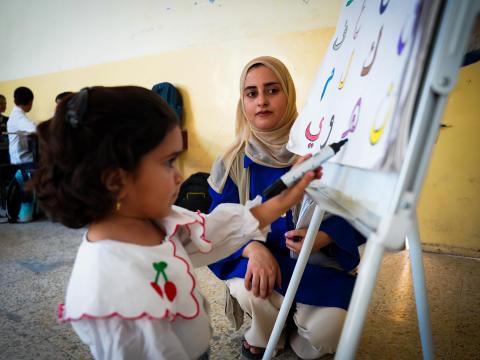Fatma Finds Her Voice at the Writing Board

A decade after the 2014 conflict in Iraq, its impact and visible scars continue to affect children today.
When the conflict began, Fatma was just a few months old. Today, at ten years old, the effects of those days remain harsh and severe. As a result of the conflict, she now suffers from stunting.
When Fatma was born and the conflict erupted, her parents were living on the outskirts of Tooz, a place they had called home for most of their lives. They were forced to leave everything behind and endured a gruelling five-day journey under the scorching sun to reach Tooz, seeking safety from insurgent threats.
Fatma's father, Omar, recounts, “We had been living in our house for forty years, and in an instant, everything changed. The house was destroyed, and we lost everything: the furniture, livestock, and vehicles.”
Omar continued, “We walked for five days under the sun. During the night, we rested and continued walking in the early hours of the morning. Those were very difficult days.”
Step by step, Omar and his wife started rebuilding their lives in Tooz.
Like many other Iraqi children, Fatma was a victim of conflict, and the hardships of displacement took a toll on her. During this challenging period, her family faced severe economic difficulties. They noticed something unusual about Fatma's physical growth but couldn’t afford to take her to doctors for treatment. Omar said, “She was neglected at that time, so she remained in her condition. If the situation had been better in Iraq, we could have taken her to other cities or even outside of Iraq for treatment. But we were trapped in our circumstances.”
After the conflict ended and their lives became more stable, Omar took Fatma to many doctors. However, most of them told him that they could only conduct experimental treatments with no guarantee of success. Fearing potential harm, Omar decided against it.
Today, ten-year-old Fatma is in the fourth grade of primary school. Despite her stunting, she finds support from those around her, especially her friends.
This year, World Vision Iraq, with funding from World Vision Singapore, implemented Catch-Up classes in Tooz to help children struggling with Arabic literacy. These after-school classes focus on improving reading and writing skills. The impact extends beyond Arabic lessons, benefiting subjects that require strong reading comprehension, such as history and physics.
When Fatma learned about the opportunity to join the Catch-Up classes, she immediately asked her parents for permission to attend.
Elham, Fatma’s Arabic language Catch-Up teacher, noticed a significant improvement in her performance. Elham shared, “Fatma is very quiet and doesn’t talk much. Her classmates love her. When I first saw her, I thought she was auditioning for the class because she was so silent. We assess students' linguistic levels through an exam to determine eligibility for Catch-Up classes. Fatma took the test but failed, so she joined the program. In the beginning, when I asked her to come forward and write on the board, she refused. However, after a month, when I called her again, she agreed. I encouraged her by having the class applaud her participation. She started enjoying the lessons and is no longer shy. Her level has improved, and this has been a very positive experience for her.”
For Fatma, the experience was equally positive. She said, “Through World Vision Iraq, I learned the alphabet. I didn’t know how to write before, but now I can. Recently, we also learned how to save water and use it wisely. Miss Elham taught me so much about reading and writing. My favourite subjects are Arabic and Mathematics. When I grow up, I want to become a dentist because I like it.”
Fatma is a shy child, but her understanding of life and maturity go beyond her age. She likes to stay organised and dress neatly. Her parents are doing their best to keep her confident and happy. Omar hopes that Fatma and his younger child, Ali, will continue their education. He doesn’t want them to experience the hardships he faced.
Omar said, “I couldn’t continue my education due to our poor financial situation, school expenses, and the long distance to school. I will not let the same happen to my children. No matter the cost or distance, I will ensure they receive an education.”
Fatma’s mother also left school early, but she is committed to helping Fatma and Ali with their education. When they struggle with their studies, Omar turns to YouTube channels for additional support.
These days, Fatma is no longer shy about walking to the front of the class and writing on the board. The Catch-Up classes have made her more confident in herself. The teachers, her classmates, and the learning environment have allowed her to fully embrace school life. She has improved her literacy skills, and during recess, she enjoys playing with dolls.
Through this project, Building an inclusive future through protecting and empowering children in Iraq, World Vision Iraq, with funding from World Vision Singapore, has helped 166 students(53 girls and 113 boys) like Fatma enhance their reading and writing abilities. These classes not only improve linguistic skills but also boost self-awareness, confidence, and overall academic performance.
The school principal, Suad, emphasised the impact of these efforts. She said, “Encouragement, awareness, and guidance have significantly improved children's participation and performance. They have started to love the classes that Elham teaches. Fatma was very shy in the beginning, but after the Catch-Up classes, she has changed.” She continued, “World Vision has had a great impact on the community in Tooz, particularly in areas where vulnerable communities live.”